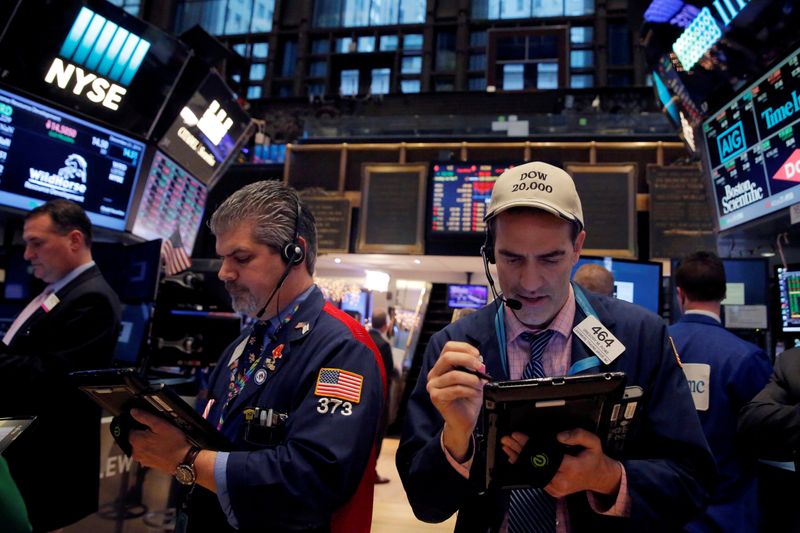This post was originally published on this site
https://i-invdn-com.akamaized.net/trkd-images/LYNXMPEFB910K_L.jpg © Reuters. FILE PHOTO: Traders work on the floor at the New York Stock Exchange (NYSE) in Manhattan, New York City, U.S.
© Reuters. FILE PHOTO: Traders work on the floor at the New York Stock Exchange (NYSE) in Manhattan, New York City, U.S.By Lewis Krauskopf
NEW YORK (Reuters) – Wall Street’s main stock indexes ended slightly lower on Tuesday, though not far from record highs, as investors awaited concrete news on whether a new round of U.S. tariffs on Chinese goods would take effect on Dec. 15, a potential turning point in a trade dispute between the world’s two largest economies that has convulsed markets.
Stock futures got a boost in premarket trade when the Wall Street Journal said U.S. and Chinese trade negotiators were laying the groundwork for a delay in the tariffs, but White House economic adviser Larry Kudlow said later that no decision had been made.
A delay would be seen as helping to pave the way for an initial U.S.-China trade deal, optimism over which has helped fuel the market’s recent run to records.
“I don’t think that the markets are going to be completely comfortable until there is a line drawn in the sand that says no new tariffs on the 15th,” said Nela Richardson, investment strategist at Edward Jones.
The Dow Jones Industrial Average () fell 27.88 points, or 0.1%, to 27,881.72, the S&P 500 () lost 3.44 points, or 0.11%, to 3,132.52 and the Nasdaq Composite () dropped 5.64 points, or 0.07%, to 8,616.18.
The S&P 500 has climbed about 25% so far in 2019, driven by three interest rate cuts by the U.S. Federal Reserve and some relief over corporate profits, along with improved investor sentiment on trade.
The Fed is due to give its latest policy decision on Wednesday; the market expects the U.S. central bank to hold rates steady. Investors also have their eyes on the European Central Bank meeting on Thursday and U.S. inflation data later in the week.
“I think the markets are just hanging tight until we get those announcements,” said Paul Nolte, portfolio manager at Kingsview Investment Management in Chicago.
In another trade-related development, Canada, Mexico and the United States agreed to an overhaul of their quarter-century-old regional trade pact, but stocks largely shrugged off the news.
Most S&P 500 sectors ended lower on Tuesday, with real estate <.SPLRCR> and materials () falling the most.
In company news, shares in Autozone Inc (N:) jumped 6.9% after the auto parts retailer beat quarterly profit estimates.
Boeing Co (N:) shares dipped 0.9% after the plane maker said it delivered fewer than half as many planes in the first 11 months of 2019 as in the same period a year earlier.
Netflix Inc (O:) shares fell 3.1% after a Needham analyst downgraded her rating on the stock and said competition could lead to the loss of 4 million premium U.S. subscribers next year.
Declining issues outnumbered advancing ones on the NYSE by a 1.02-to-1 ratio; on Nasdaq, a 1.09-to-1 ratio favored advancers.
The S&P 500 posted 23 new 52-week highs and two new lows; the Nasdaq Composite recorded 83 new highs and 66 new lows.
About 6.3 billion shares changed hands in U.S. exchanges, below the 6.7 billion daily average over the last 20 sessions.

